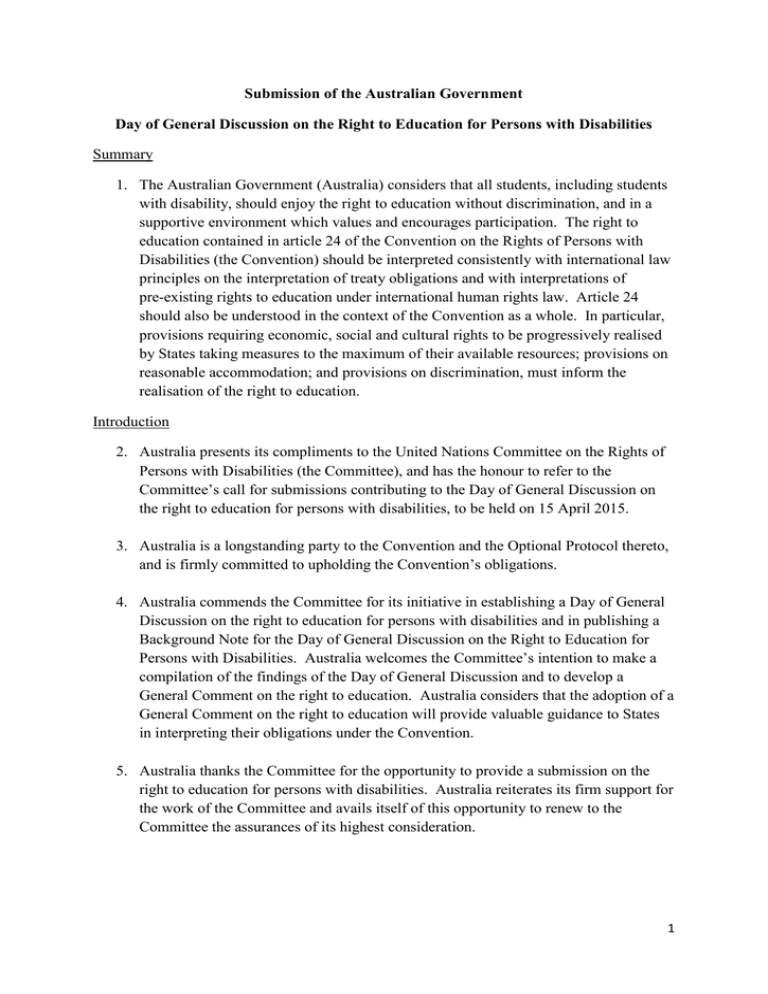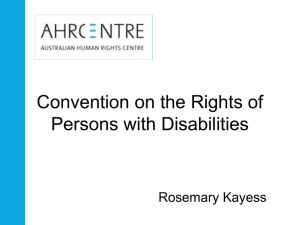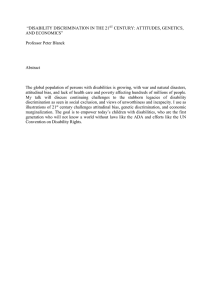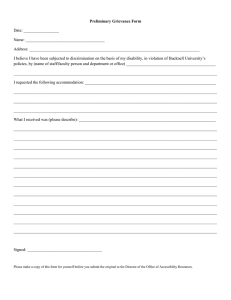Submission of the Australian Government
advertisement

Submission of the Australian Government Day of General Discussion on the Right to Education for Persons with Disabilities Summary 1. The Australian Government (Australia) considers that all students, including students with disability, should enjoy the right to education without discrimination, and in a supportive environment which values and encourages participation. The right to education contained in article 24 of the Convention on the Rights of Persons with Disabilities (the Convention) should be interpreted consistently with international law principles on the interpretation of treaty obligations and with interpretations of pre-existing rights to education under international human rights law. Article 24 should also be understood in the context of the Convention as a whole. In particular, provisions requiring economic, social and cultural rights to be progressively realised by States taking measures to the maximum of their available resources; provisions on reasonable accommodation; and provisions on discrimination, must inform the realisation of the right to education. Introduction 2. Australia presents its compliments to the United Nations Committee on the Rights of Persons with Disabilities (the Committee), and has the honour to refer to the Committee’s call for submissions contributing to the Day of General Discussion on the right to education for persons with disabilities, to be held on 15 April 2015. 3. Australia is a longstanding party to the Convention and the Optional Protocol thereto, and is firmly committed to upholding the Convention’s obligations. 4. Australia commends the Committee for its initiative in establishing a Day of General Discussion on the right to education for persons with disabilities and in publishing a Background Note for the Day of General Discussion on the Right to Education for Persons with Disabilities. Australia welcomes the Committee’s intention to make a compilation of the findings of the Day of General Discussion and to develop a General Comment on the right to education. Australia considers that the adoption of a General Comment on the right to education will provide valuable guidance to States in interpreting their obligations under the Convention. 5. Australia thanks the Committee for the opportunity to provide a submission on the right to education for persons with disabilities. Australia reiterates its firm support for the work of the Committee and avails itself of this opportunity to renew to the Committee the assurances of its highest consideration. 1 Education in Australia 6. Article 24 of the Convention provides that States Parties recognise the right of persons with disabilities to education, and provides that with a view to realising this right, without discrimination and on the basis of equal opportunity, States Parties shall ensure an inclusive education system at all levels. Article 24 also provides that States Parties shall enable persons with disabilities to learn life and social development skills; shall take appropriate measures to employ teachers including teachers with disabilities who are qualified in sign language and/or Braille and to train professionals and staff; and shall ensure that persons with disabilities are able to access general tertiary education, vocational training, adult education, and lifelong learning. Australia considers the right to education forms an important basis for the realisation of a number of other rights contained in the Convention. States Parties to the Convention have a legal obligation to take steps to respect, protect, promote and fulfil the right to non-discrimination, and Australia recognises that non-discrimination is a fundamental principle of the Convention. 7. Australia considers that all students, including students with disability, should enjoy the right to education without discrimination, and in a supportive environment which values and encourages participation by all students. Australia believes its education system is consistent with the obligations under article 24 of the Convention. 8. Discrimination against persons with disabilities in Australia is unlawful under the federal Disability Discrimination Act 1992, including in relation to education. The Disability Discrimination Act 1992, the Disability Standards for Education, the National Education Agreement, and the Schools Assistance Act 2008 require that all school-aged children are given the opportunity to enrol in a safe and supportive school. 9. All Australian children, including children with disabilities, are entitled to attend primary and secondary education. Australian school education is made up of both government and non-government education systems and schools. Schools of different affiliations and educational philosophies have been part of Australia’s diverse schooling system for decades and have made a significant contribution to the education of Australian children. School education options for students with disability include enrolment in mainstream classes in mainstream schools with additional support, specialist classes or units in mainstream schools, and specialist schools. 10. Australia commends the focus of article 24 towards ensuring inclusive education systems and is committed to promoting inclusive education practices. Approximately 87% of students (5 to 20 years old) with disability in Australia attend mainstream 2 schools.1 Of these, 77% of students are placed in a mainstream class and 23% are placed in a specialist class within a mainstream school. Around 13% of students (5 to 20 years old) with disability attend a specialist school specifically for students with disability. 11. The Disability Discrimination Act 1992 requires reasonable accommodation (called ‘reasonable adjustments’) to be made for people with disability to participate in education where this will not cause unjustifiable hardship. Education providers have a positive obligation to make changes to reasonably accommodate the needs of a student with a disability. The Disability Discrimination Act 1992 applies to all education providers, public and private. 12. Australia has in place Disability Standards for Education, which have the force of law and give further precision to the rights and obligations under the Disability Discrimination Act 1992. The Disability Standards for Education set out the rights of people with disability to access education on an equal basis with others. Education and training providers must make reasonable adjustments to accommodate a student with disability, except in instances when this would impose unjustifiable hardship on a person or organisation. In 2010, a review of the Disability Standards for Education was conducted, which included recommendations to improve inclusive education practice. The Australian Government committed to promoting inclusive education practices and to improving access for all children to high quality, inclusive education. 13. The educational setting in which a student is placed in Australia depends on the preference of the parent or carer and the needs of the student. Australia respects and supports the responsibility of the parent or carer to choose the most appropriate educational setting for their child. Specialist schools for students with disability exist within the education system to ensure that effective individualised support measures are available for those instances where parents believe that an individual’s needs may be more appropriately met in a specialist setting. This is consistent with the obligations under article 24. 14. In addition, Australia’s National Disability Strategy 2010-2020 (‘Strategy’) provides a 10-year national policy framework that seeks to drive a more inclusive approach to the design of policies, programs and infrastructure so that people with disability can participate in all areas of Australian life. Improving access to buildings, transport, social events, education, health care services and employment will provide opportunity for people with disability to fulfil their potential as equal citizens. The Strategy is also an important mechanism to ensure that the principles underpinning the Convention are incorporated into policies and programs affecting people with disability, their families and carers. 1 Australian Bureau of Statistics, Survey of Disability, Ageing and Carers, 2012. 3 15. One of the central outcomes of the Strategy is to ensure that people with disability achieve their full potential through their participation in an inclusive high quality education system that is responsive to their needs, and that people with disability have opportunities to continue learning throughout their lives. The Strategy commits to a range of actions designed to achieve this outcome, which focus on: reducing barriers and simplifying access for people with disability to an inclusive education system; ensuring the needs of students with disability are incorporated into National Agreements, National Partnerships and other learning and skills-related frameworks and policies; developing innovative learning strategies and supports for students with disability to enable them to reach their full potential; and identifying and establishing best practice for transition planning and support through all stages of learning and from education to employment. Realising the right to education 16. The Convention is a major step in recognising and raising awareness of the rights of persons with disability to live life to their fullest potential, and the need for a new approach in this regard. However, the Convention does not create any new human rights, but rather, clarifies existing rights under the International Covenant on Civil and Political Rights (ICCPR) and International Covenant on Economic, Social and Cultural Rights (ICESCR) to ensure they can be effectively and practically exercised by persons with disabilities on an equal basis with others. This reflects the view of the UN High Commissioner for Human Rights2 and a number of academic commentators.3 This is also supported by the references to the ICCPR, the ICESCR, the Convention on the Elimination of All Forms of Racial Discrimination, the Convention on the Rights of the Child and the Convention on the Elimination of All Forms of Discrimination against Women in the preamble.4 17. In this way, article 24 does not create any new human rights, but rather, clarifies existing rights to education to ensure they can be effectively and practically exercised by persons with disabilities on an equal basis with others. Australia submits that the Committee ought to interpret article 24 consistently with other treaty bodies’ interpretations of the right to education under international law. 18. Australia notes the importance of international law principles applicable to the interpretation of treaty obligations, including that a treaty be interpreted in good faith The UN High Commissioner for Human Rights has emphasised that the Convention ‘does not recognize any new human rights of persons with disabilities, it clarifies the application of existing rights to the specific situation of persons with disabilities’ in the Annual Report of the United Nations High Commissioner for Human Rights and Reports of the Office of the High Commissioner and the Secretary-General: Thematic Study by the Office of the United Nations High Commissioner for Human Rights on enhancing awareness and understanding of the Convention on the Rights of Persons with Disabilities (2009) A/HRC/10/48, page 11. 3 Peter Bartlett, ‘The United Nations Convention on the Rights of Persons with Disabilities and Mental Health Law’ (2012) 75(5) Modern Law Review, pages 752,752-753. 4 The preamble provides relevant context to the interpretation of the Convention: Vienna Convention on the Law of Treaties opened for signature 23 May 1969, [1974] ATS 2, Article 31(2)(a) (entered into force 27 January 1980). 2 4 in accordance with the ordinary meaning to be given to the terms of the treaty in their context and in light of its object and purpose, and, in the case of ambiguity, recourse to supplementary means of interpretation, including the preparatory work of the treaty. Australia emphasises the need to ensure views included in the General Comment reflect the interpretation of the relevant obligations as understood by States Parties to the Convention. 19. The right to education in article 24, read as a whole, is an economic, social or cultural right, and is derived from the right to education contained in article 13 of the ICESCR. For all economic, social and cultural rights contained in the Convention, article 4(2) of the Convention sets out that each State Party ‘undertakes to take measures to the maximum of its available resources and, where needed, within the framework of international cooperation, with a view to achieving progressively the full realization of these rights’. Australia considers it important that any General Comment on the right to education reflect that article 24 is subject to the provisions of article 4(2). 20. Article 24(2)(c) provides that in realising the right to education, States Parties shall ensure that reasonable accommodation of the individual’s requirements is provided. Reasonable accommodation is defined in article 2 of the Convention to mean ‘necessary and appropriate modification and adjustments not imposing a disproportionate or undue burden, where needed in a particular case, to ensure to persons with disabilities the enjoyment or exercise on an equal basis with others of all human rights and fundamental freedoms’. Australia considers it important that any General Comment on the right to education reflect the reasonable accommodation standard as defined in article 2. As set out above, Australia respects the requirement to provide reasonable accommodation under article 24 of the Convention and considers that the requirement for reasonable adjustments under the Disability Discrimination Act 1992 is in accordance with the definition of reasonable accommodation in article 2 of the Convention. 21. In accordance with article 4 of the Convention, States Parties undertake to ensure and promote the full realisation of all human rights, including the right to education, for all persons with disabilities without discrimination of any kind on the basis of disability. Article 5(1) requires States to recognise that all persons are equal before and under the law and are entitled without any discrimination to the equal protection and equal benefit of the law. Article 5(2) requires States to prohibit discrimination on the basis of disability and guarantee to persons with disabilities equal and effective legal protection against discrimination on all grounds. As indicated above, Australia submits that the Convention is firmly anchored in existing principles of international human rights law. Australia submits that the Committee ought to interpret its provisions consistently with other treaty bodies’ interpretations of basic principles of human rights, including non-discrimination. In this way, Articles 4 and 5 should be interpreted consistently with the established approach under international law that 5 legitimate differential treatment will not constitute discrimination. 22. In addition, in accordance with article 5(3) of the Convention, States Parties commit to ‘take all appropriate steps to ensure that reasonable accommodation is provided’, in order to promote equality and eliminate discrimination. 23. These provisions require States Parties to protect persons with disabilities from differential treatment that amounts to discrimination, and to take appropriate steps to ensure reasonable accommodation is provided in order to eliminate discrimination in relation to education. A General Comment addressing discrimination in relation to the right to education should reflect the standards set out in the Convention and the existing principles of international human rights law and acknowledge that not all forms of differential treatment amount to discrimination and that an inability to provide all available accommodations does not amount to a failure to provide reasonable accommodation. *** 24. Australia again thanks the Committee for the opportunity to provide a submission to the Day of General Discussion on the right to education for persons with disabilities. Australia would welcome the opportunity to further consider and comment on any draft General Comment as this is developed. Australia reiterates its firm support for the work of the Committee and avails itself of this opportunity to renew to the Committee the assurances of its highest consideration. 6






